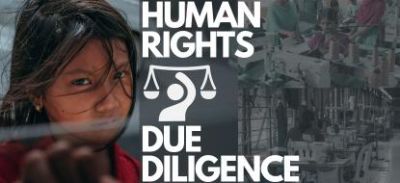The European Commission today finally proposed draft legislation on Corporate Sustainability Due Diligence. Despite some interesting features, it falls far short of what is needed to protect human rights and the environment.
It particularly falls short on the concrete involvement of workers and trade unions in shaping and monitoring sustainable business due diligence strategies, aimed at preventing or ceasing adverse impacts on human rights and the environment.
A strong directive on Sustainable Corporate Due Diligence is desperately needed at a time of rising human rights violations including abuse of labour and trade union rights by major European companies.
Instead, some 238 days after the Commission was scheduled to present the directive, the draft proposal raises real concerns that it delivers much too little to impulse the necessary behavioural changes in business to effectively address and prevent violations of human rights and damage to the environment
An ETUC analysis of the draft found in particular:
- The directive puts into EU law existing voluntary business practices such as codes of conducts, “roadmaps” and “corrective action plans” which remain unilaterally adopted by the company, already known for their weak performance related to corporate social responsibility, leaving businesses to play judge and jury over their own practices.
- The draft directive includes “social and labour rights with reference to a very limited number of international standards but with no reference to key European Human Rights acts such as the Council of Europe European Convention on Human Rights and European Social Charter, nor the EU Charter of Fundamental Rights.
- The EU law will only apply to companies with a turnover of more than 150 million Euros and more than 500 staff (or 40 million Euros and 250 staff if it’s engaged in a high-risk sector) despite the European Parliament having rejected a proposal to exclude SMEs.
- The role of trade unions is limited to filing internal complaints about violations rather than full involvement in the design, monitoring and enforcement of due diligence, despite the European Parliament having explicitly and with a large majority adopted a proposal with a strong and proactive involvement of trade unions and other stakeholders.
- Although some positive new proposals for sanctions, such as temporary suspension of business operations and temporary suspension of state aid and use of (EU) public funds, it limits liability to civil, not mentioning criminal status, let alone the mild obligation of directors.
Commenting on the Commission’s proposal, ETUC Confederal Secretary Isabelle Schömann:
“It is a first step in the right direction. But an ambitious and future proof proposal to prevent and remedy human rights violations and environmental damage looks different. To trigger the long awaited and necessary changes in business practices, the European Parliament proposal echoes much better and with vision what the European Union should deliver to hold business and suppliers accountable for the adverse impacts of their operation on people and the planet.
“The Commission seems to have opted for the lowest common denominator, as a baseline. The proposal includes some useful new tools and procedures. It recognises that human rights include social and labour rights, but isn’t it the bare minimum, not even living up to its own values and principles, as anchored in the Treaties.
“The Commission misses the huge call of trade unions and civil society for strong rules on Sustainable Corporate Due Diligence. It is now draft up to the European Parliament to improve this late and underwhelming draft directive. The ETUC will work with MEPs to fight for a directive that makes a real difference and genuinely holds business to account for human rights or environmental violations.”
Notes
More information:
https://www.etuc.org/en/time-act-human-rights-due-diligence-and-responsible-business-conduct

